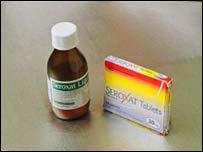
Experts say higher doses are no more
effective |
Experts
have warned doctors not to start patients on high doses of the
antidepressant Seroxat.
The Committee on Safety of Medicines says patients should
initially be given a dose of 20mg a day.
But it revealed that last year 17,000 people were given higher
doses, which could increase the risk of side effects such as
insomnia and nausea.
There have also been claims Seroxat is addictive and can increase
the risk of violent behaviour in some patients.
Guidance for
doctors already states that adults taking Seroxat, a Selective
Serotonin Reuptake Inhibitors (SSRIs) should be started on a dose of
20mg.
But the CSM said it decided it was necessary to issue a reminder
after the scale of prescribing at higher doses became clear.
It said there was no evidence that giving patients with
depression a higher dose made the treatment more effective.
The CSM warned doctors should resist the temptation to rapidly
increase the dose if the drug does not seem to be working, as this
could increase the risk of side effects.
The CSM said people who were already on a higher dose should have
their treatment reviewed at their next appointment.
But it warned patients should not stop their treatment suddenly,
and should consult their doctor about how to reduce their dose
gradually.
The reminder is part of the CSM's expert review on all SSRIs.
'Safe dosage'
The CSM's chairman Professor Gordon Duff, said: "The CSM has
issued this important reminder following a reanalysis of the
available data and new evidence showing the extent to which new
patients have been started on higher than the recommended dose.
"Patients who are concerned should consult their doctor. On no
account should medication be stopped suddenly as this can cause side
effects."
Health Minister, Lord Warner said: "It's important to ensure that
health professionals are reminded to follow the recommended safe
dosage for patients receiving Seroxat for the first time so that
patient safety is not compromised.
"The decision to issue this reminder was taken following a
thorough review by the CSM of the available evidence, and will help
to make sure that doctors and patients are able to choose the right
treatment."
The guidance will be issued to doctors by the Chief Medical
Officer.